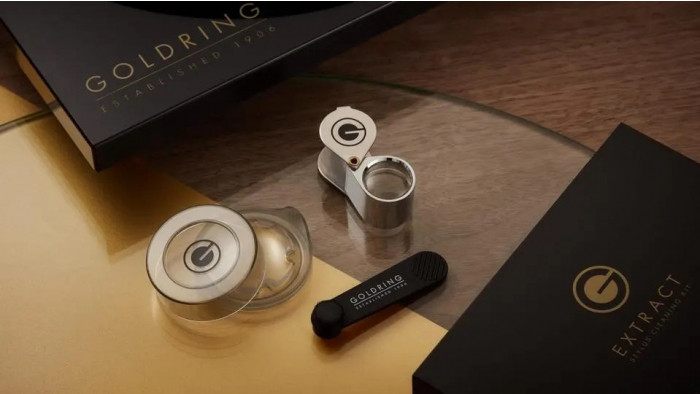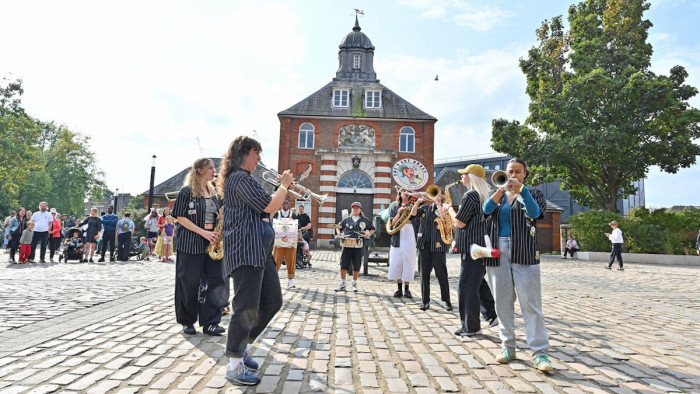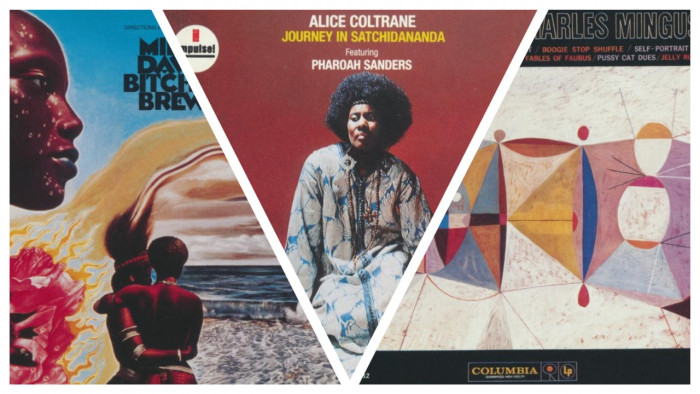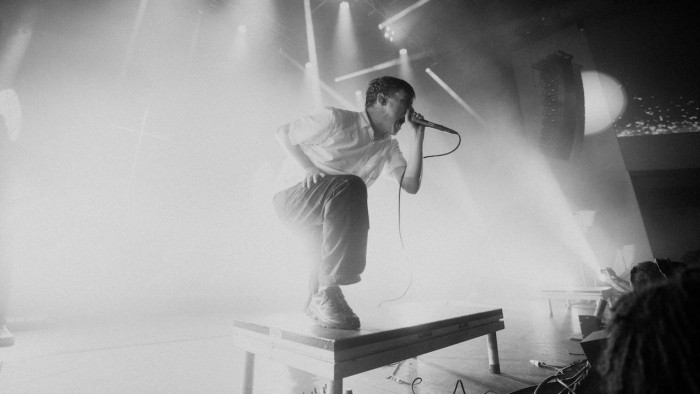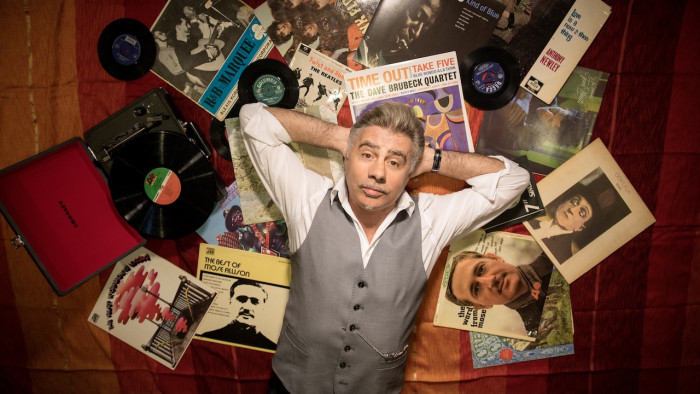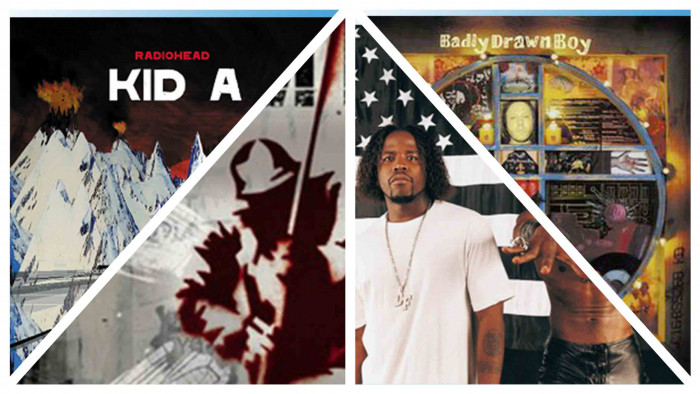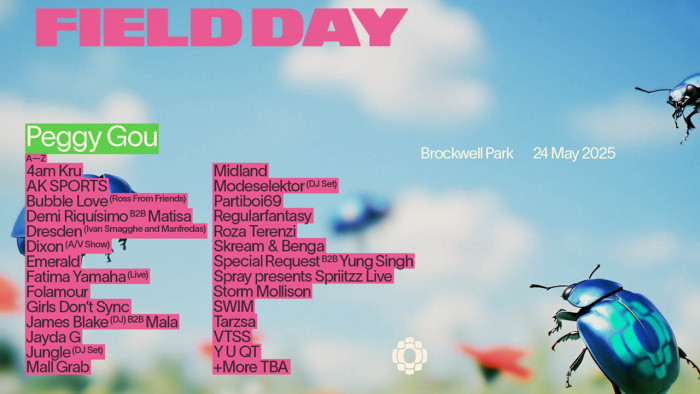Nick Van Eede: How I wrote (I Just) Died In Your Arms and I've Been In Love Before
The Cutting Crew frontman talks us through his hit power ballad


Ultimate Power is a UK club night that plays nothing but power ballads and celebrates its tenth birthday this year. Co-founder Dave Fawbert spoke to Nick Van Eede, guitarist, lead singer and songwriter with Cutting Crew, about two of the band's biggest hits
Cutting Crew's 'Add To Favourites' is out now, for tour dates visit cuttingcrew.biz
It's 30 years in July since (I Just) Died In Your Arms Tonight came out...
It is - it's astonishing. All the old clichés about doesn't time fly but - thirty fuckin years! That's a long time!
An obvious place to begin, how did you write the song? I read on Wikipedia that you came up with title while you were having sex with your girlfriend - is that true or is a good bit of rock and roll hype?
A sort of mixture I suppose! I do remember it being written very quickly. A lot of the best ones always do come out like that you know - and I remember it was after getting back together with an old girlfriend - the title scratched down on a bit of paper and that really was - two or three days later I thought, "That's a good title". I often use titles actually, as a starting point, and one of the things about these big power ballads, there's some cracking titles in there. I think the Eighties were very good at titles! "I just died in your arms" - love it or hate it, it's one of those, it's a title you're gonna go, "Well, what the fuck's this all about?"
Was it written on piano or guitar?
Like a lot of the old poor musician stories - I was living in a mate's house in Epsom I think, dossing on the settee. I always played guitar - up until that point I'd always been in new wave, rocky, edgy, borderline punky bands and this was something totally different for me. They had this shitty little keyboard, y'know with the drums involved in it, where you press a button and it goes "boom, tchk, boom, tchk," and I wrote the opening keyboard riff... and we were off and running... that was probably the first-ever song I wrote on a keyboard.
How long was it between writing the song and taking it to the studio for the full production?
It was written a good year before because I had amassed these songs as 'Nick', and then Kevin McMichael - sadly departed Kev from Nova Scotia in Canada - he came over, I'd met him previously in my band a couple of years earlier before Cutting Crew - and when we met out there, I'd never heard a greater guitarist and we became really good mates and basically we said, "If ever your band splits up," and, "If ever your band splits up," then we'll do something. So he eventually came over, he landed at Heathrow Airport, in true Kevin bandito style, with his unshaven beard, his guitar and a toilet bag and that's all he had! Wonderful. It took about a year and we put the demos together, put the band together and y'know - you could not believe how quickly it took off then. I mean, you just wait all your life and you think, "Oh well, this might never happen" and then suddenly - bang - and our feet never hit the ground for four years.
Speaking of Kevin, the guitar work on the track is so intricate and so varied, it never quite stays the same. But how long did that take him to do - did you have input into it, or did you let him get on with it?
It was a brilliant mishmash of both - I'd recorded the demo, as I said, back in Epsom a year earlier, with me literally playing twelve guitar parts, all over the top of each other. And he listened to it and I said, "Right Kev, can you just get the guitar part?" he said, "Fuck you!" There were twelve parts! So he cobbled together the main, if you like, the rhythm parts - but no... it was all Kevin that wrote those beautiful motif lines. He was a very clever man, a very reluctant pop person. He was King Crimson - not a progger - but that kind of weirdo end of music. And he found it all rather hilarious that we were on Top of the Pops having to dress up in long black coats. He was very bemused by it all and almost to the day he died, he always found it rather bizarre. A great guy, I miss him a lot, a very, very dear friend and life's never been the same without him.
Was it a quick recording process? Some of these big eighties songs take three months to mix and all this...
It was the most painful thing I've ever done in my life! I'd been around for a long time before then, so I wasn't an idiot in the studio, and since then I've made four albums so I know with lots of experience how things can go wrong, or how things take long, or the drummer got ill, or something like that, but this was excruciating. Everybody spotted what a good song it was - we were signed to Siren Records, which was part of the Virgin empire and Branson got a sniff of it, so it was kind of - funny word - fast-tracked, y'know, VIP'd and we were sent to New York and we lived in a loft apartment down in Tribeca - five kids who'd never been out of Sussex really. We lived the life.
It was horrible - I mean, I'm not gonna name any names, but let's just say the first version was shocking. And so we came home with our tails between our legs - and in fact the record company were going to release it, they went, "This isn't shocking, this is a very good version of that lovely song!" and I said, "If you release that, I will never, ever turn up to anything ever again to promote it," and they were like, "Oh, sulky Nick!" So we did it again and went through two producers before we actually got there. Finally Terry Brown, my dear friend from the earlier days in Canada, who produced all the Rush albums - you know, a kind of prog rocker if you like - he came over, we flew him in without the record company knowing, we sacked the producer and from that moment on it was done in a week.
The lead vocal was recorded at Air Studios when it was on Oxford Street - right on the corner of Oxford and Regent Street - and I remember singing it with my pregnant girlfriend standing in front me with her hand on her wristwatch going, "Get a fucking move on!".
It's always a classic question, but when you got that final version, did you think "this is a hit"?
I have to say that it was a very exciting moment, once we'd finally mixed it. There were people... you know those old stories you hear when Sting popped in to Dire Straits' studio and they sang MTV or something like that - well people were coming in to our room and going, "What is this? Who are you? Who are you guys - Cutting who?" So the buzz was phenomenal. I did really think, 'My God, if we can get lucky, we've got the biggest chance I'll ever have in my life'.
Which leads me on to some of the stuff I wanted to share with you really, because I thought a bit about your question - it's not often I sit down and think about an interview question but I wanted to get it right. But luck is such an important thing. You look back on these things and everything has to be lined up to have a hit record. So this is a little bit off track of power ballads, but it's important and that is that, at that time I was looking alright, I was singing alright, I'd found this voice that worked, we had a brand new record company that Branson was chucking shitloads of money into, we had a video that seemed to capture people's imaginations, so it all just lined up.
And then when we got to America - and they remixed it! Can you imagine having a hit record for the first time in your life, it's been number one in about 14 countries, and then America goes "Yeah, it's OK, but it needs a remix"! I remember sitting in the studio - Charlie Chaplain studio, A&M studios in Hollywood - as this man, Shelly Jakus, who remixed it, built this mountain of outboard gear - compressors, gates, reverb - we could hardly see him in the studio and I'm going, "My God don't fuck this up" and of course, it's actually better than the British version - and it went on to become number one. So a combination of luck - and I also wanted to tell you this: I do think that the smart instant reaction is the reason that my song and all those others - I Want to Know What Love Is - and Take My Breath Away and all those - the reason that they have lasted so long - my instant reaction is they're just very, very well-written songs, they just press all the buttons - when the kids sing along - there's an emotional attachment to it and, I don't mind being quoted on it, but when I write a song I try to get that happening. Puccini did I'm sure and I'm sure Mozart did - you know, I'm not comparing myself with them - but those big big anthem songs do that. So that's my 'projecting my genre' answer!
They're unabashed. And because they're unabashed - which brings me on to my second point - and that is that, the posh answer is that because they're so unabashed, you can get this kind of cheesy tag to it, which the seventies didn't really get and the nineties certainly didn't, the nineties were all staring at your shoes and serious. But it's a very odd tag that happens - so you can get into the realms of glorious parody whereby they make fun of it and I've completely got over it - I don't get insulted one bit - but if you look on my Facebook page we just posted something I never knew existed and it's Will Ferrell being a wedding singer where he's singing (I Just) Died In Your Arms and he's only learned the chorus - he only gets as far as the chorus and the groom stands up and says, "Well come on then, finish it!" and he's like, "It's all I know!" So this parody is wonderful, I'm very comfortable with it, but it is a weird thing that you don't get parodies of the Beatles, you don't get parodies of the Stones, you know sixties, seventies, you don't get parodies really of T-Rex or anything, but the eighties was this wonderful, unabashed, take me as I am, big shoulder pads, huge melodies, so we come for a bit of kicking but I'm quite comfortable with it.
eBaum's World - VideoWell, at the end of the day - this is the music that's lasted. You wouldn't believe the reactions we get! I also wanted to talk about I've Been In Love Before, it was a hit at the time but obviously hasn't quite had the attention of (I Just) Died In Your Arms Tonight - do you think that song's just as good?
Fans, hardcore fans, always prefer it - the ones who know the whole lot. They always put it ahead of Died In Your Arms. The other 25 million people in the world probably think Died In Your Arms was the best song we ever did. But it's a gorgeous tune and it was top 10 in America and you know you get these funny awards that come through every now and again and Died In Your Arms has had 3 million plays now in America, it's up with songs like Lola, and Hello Goodbye and Love Me Do, which blows my mind, and I've Been In Love Before, though, has had 2 million plays, so it's a big American hit. It never took off over here and to be honest, it was the lynchpin in what went wrong with Cutting Crew - if only I've Been In Love Before had been a proper big bona fide hit like we all thought it should have, then we wouldn't be tagged this - not one-hit wonder, we've never quite been called that - but that kind of 'only remembered for one song'. It's a gorgeous tune, it's a gorgeous song, we still play it, we do a beautiful unplugged version of it, beautiful.
It is a stunning track. One more question - what other power ballad do you wish you'd written?
Well I think the one that always works for me is I Want to Know What Love Is. I've worked with them - Mick the writer and Lou the singer... imagine if I'd sung that, imagine if Neil Finn had sung that, imagine if George Michael had sung that - it wouldn't have been a hit. It's all about that sensational vocal performance. And also, it tie in with another point I wanted to make - I think the reason that these anthems they last so long, they're so enduring is that they were all released in that MTV age, when it first came out. Up until then we'd heard things on the radio - if the Beatles brought out a song, all you'd do was hear it or you'd get some footage of them doing it in a stadium. In the Eighties it was the first time ever people went, "Oh my god, that's Berlin, no hang on it's Tom Cruise, oh it's a movie. Oh wow! And Cutting Crew, oh look at his hair!" So these little tiny film units went alongside the films and I think that they reinforced the whole thing - forty years later, whether it be a new generation of kids at your club or the old mums and dads, they remember those little movies as well.
